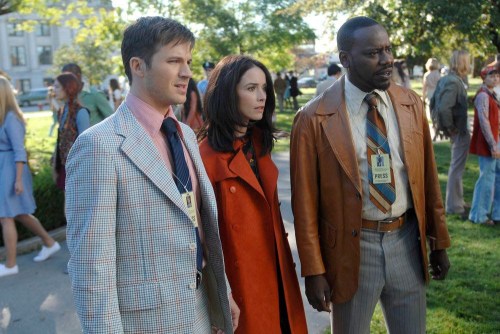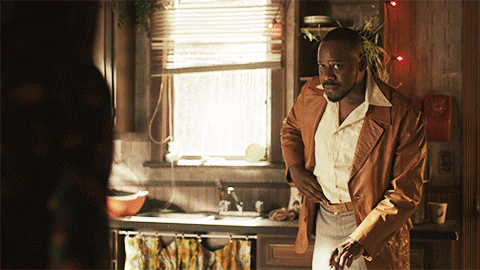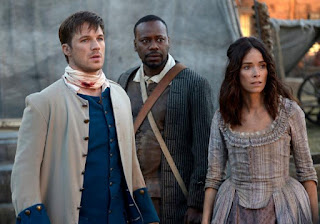
"TIMELESS": SECRETS AND MISTRUST
Ever since Season Two of NBC's "TIMELESS" completed its run, I have found myself re-watching the series from the beginning. It has been something of a slow burn, but I did not wish rush through it. Recently, I watched Season One episode called (1.06) "The Watergate Tape" and discovered something unpleasant about the series' trio of protagonists. Well . . . at least two of them.
Ever since the series' premiere, (1.01) "Pilot", the initial protagonist, the former NSA agent and rogue time traveler Garcia Flynn, has been trying to convince main protagonist Dr. Lucy Preston that they would become future colleagues and that he had possession of her future diary. Flynn also tried to warn Lucy about Rittenhouse, a mysterious political organization that has been at the forefront of the United States' development since the American Revolution. Horrified by the idea of being a colleague with a man she regarded as nothing more than a murderer, she kept silent about the encounters.
In the same episode, the creator of the two time machines and head of Mason Industries, Connor Mason, had instructed his programming engineer/time machine pilot Rufus Carlin to provide an audio recording of his missions with Lucy and U.S. Army Delta Force operative Master Sergeant Wyatt Logan. Although Rufus agreed, he changed his mind in the next episode, (2.02) "The Assassination of Abraham Lincoln". To convince Rufus to cooperate, Mason reminded the engineer that he had bankrolled the latter's education. When Rufus had refused to continue recording their missions in (1.04) "Party at Castle Varlar", a Rittenhouse operative threatened to harm Rufus's family if he did not cooperate. Rittenhouse's threat was issued again in "The Watergate Tape" when an older operative (or official) appeared outside of Rufus' home with Mason inside a limousine. The Rittenhouse official made it clear that the organization was monitoring Rufus' family. He also made it clear that if Rufus continues to refuse recording the time travel missions, the Carlin family might cease to exist.
Both Lucy's previous encounters with Flynn and Rufus' secret recordings finally came to light in this episode. After Flynn managed to capture the trio not long after their arrival in 1972 Washington D.C., he revealed his previous encounters with Lucy to both Rufus and Wyatt. Needless to say, both men were surprised and upset. While Flynn kept Wyatt as a hostage, he tasked both Lucy and Rufus to find the missing "doc" that was mentioned in the infamous 18 1/2 missing minutes from one of President Richard Nixon's Watergate tapes. Both Lucy and Rufus discovered that the "doc" is actually a young African-American woman, whose family has been associated with Rittenhouse for generations. The "Doc" wanted to make her escape from the organization. Lucy overheard Rufus contact Rittenhouse and discovers that he had been providing the organization with audio recordings of their missions and reacts with anger. Meanwhile, Flynn informed Wyatt of his discovery that Rittenhouse had bankrolled Mason Industries and the organization's murders of his wife and child. Because of this, Flynn became determined to bring down Rittenhouse, using the stolen time machine created by Mason. By the end of the episode, a very angry Wyatt learned about Rufus' recordings on Rittenhouse's behalf and instructed the latter to continue recording their missions.
I must not have understood the emotions that emitted from the protagonists in this episode, when I first saw it. As far as I knew, Lucy was angry at Rufus for recording their missions for Rittenhouse. Rufus was angry (at first) over Lucy's previous discussions with Flynn. And Wyatt was angry at both of them for keeping secrets from him. I did not pay much attention to all of this, because in the following episode, (1.07) "Stranded", the trio made their peace with each other. But after this latest re-watch of the episode, I found myself speculating on the two secrets kept by Rufus and Lucy and the reactions to them.
I understood why Rufus and Wyatt were upset over Flynn's revelations that he had been in contact with Lucy. As far as both men were aware, Garcia Flynn was an enemy determined to bring down the United States government and the man who had murdered his family. The U.S. government have been trying to capture or kill him since the first episode. And considering that Lucy had failed to inform them of her interactions with Flynn since the first mission, I would not have been surprised if Wyatt and Rufus had began to wonder about her role on their team or whether she had been associated with Flynn all along.
However, my feelings regarding Rufus' situation proved to be different. I understood Lucy and Wyatt's initial anger over their discovery that the former had been recording their missions. But Rufus had made it clear that after their first mission he had refused to continue his recording until Rittenhouse had threatened to kill his family. He had even made an effort to point out that the organization had been observing him, his mother and his brother. Although Wyatt had instructed Rufus to continue recording the missions until they can learn more about Rittenhouse . . . he remained angry at and distrustful of the engineer. So did Lucy. And for some reason, I found myself feeling angry at both of them.
The more I thought about it, the more I realized that Wyatt and Lucy had allowed their anger to get the best of them . . . to the point that they seemed unwilling to comprehend the threat that Rittenhouse had personally posed to Rufus. It was bad enough that Connor had used his past sponsorship of Rufus's career to blackmail the latter into cooperating.
Following Wyatt's discovery of Flynn's past history of Rittenhouse and the threats that Rufus had received, I found myself wondering why he still remained angry at the engineer. Surely he understood why Rufus had agreed to cooperate with Rittenhouse? The latter's family had been threatened. And considering Flynn's revelation that Rittenhouse had murdered his family, surely Wyatt understood that Rufus had a good reason to cooperate and keep those recordings a secret in the first place. On one level, he seemed to understand. After all, he did instruct Rufus to continue the recordings. But why remain angry at the other man? Why declare in an angry voice that he could never trust Rufus again? Was Wyatt really that self absorbed and hypocritical? Did he really believe that Rufus should have thought of the team over the Carlin family? Was he privately pissed that he might have to consider that Garcia Flynn's conflict with Rittenhouse had some merit?
One might accuse Rufus of hypocrisy, considering his reaction to the revelation that Lucy had been in contact with Flynn since the first mission. However, I realized that Rufus had a better excuse for keeping his secret than Lucy had for keeping hers. His family had been threatened. Their safety, along with his, was at stake. Had Flynn threatened Lucy to keep their past conversations a secret? Had he threatened to kill her mother, Carol Preston, if she reveal their encounters to Rufus, Wyatt and Agent Christopher? The answer to both questions were "no". Not only did Flynn not threatened Lucy to keep their private encounters a secret, he was the one who revealed those encounters to Rufus and Wyatt. And he had seemed a bit surprised that Lucy's teammates never knew.
And yet . . . like Wyatt, Lucy had remained angry at Rufus by the end of the episode. I found myself wondering why she had remained angry. She seemed well aware that Rittenhouse was a threat. Not only had Rufus informed her that the organization had threatened him and his family, but that it also wanted "the Doc" killed. More importantly, the latter had explained to Lucy on just how dangerous Rittenhouse could be. Yet, she was still pissed at Rufus by the time they had returned to 2016. What the fuck? Was she pissed . . . jealous that Rufus had a better excuse to keep his activities a secret than she had for keeping her conversations with Flynn a secret? Frankly, I found Lucy's hypocrisy even worse than Wyatt's. After all, what was her excuse? She was appalled at the idea of her future self becoming a friend and/or ally of Garcia Flynn?
I am certain that many fans of the show would find my above ramblings inconsequential. As I had pointed out earlier, the tensions between Rufus, Lucy and Wyatt were eventually settled by the next episode. Why make a fuss over what happened between them in "The Watergate Episode". Well . . . I had read several articles about the episode. Although some reviewers had discussed how tensions had arose between the three colleagues, no one had really bothered to discuss the hypocrisy that seemed seemed rampant in this episode. Or how this episode had pretty much exposed the uglier side of their natures - especially that of Lucy and Wyatt. At this point in the series, no one seemed willing to discuss this. And perhaps . . . the episode had annoyed me so much that I had to express myself in some form.
















































